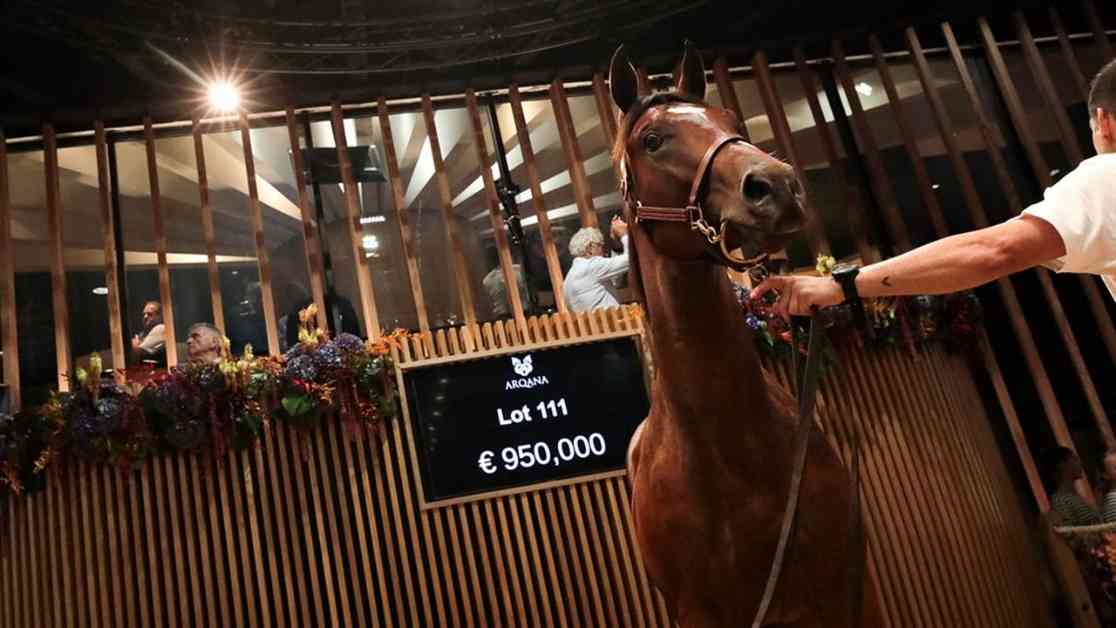Deauville Horse Auctions: Thoroughbred Foal Sales Experience a Decline
The annual Deauville horse auctions, organized by Arqana, did not break any records this year. After two consecutive years of increases, with a record set in 2023 at a turnover of 56.9 million euros, the three days of auctions from August 16th to 18th for the offspring of the best stallions of the moment saw a decline of 10.9%. Despite this decrease, the sales still remain significantly above what was achieved in previous editions. Since 2022, Arqana has reached a milestone by surpassing 50 million euros in turnover for these sales. In 2024, they achieved a respectable turnover of 50.2 million euros, just behind the record-breaking sale of the previous year. The percentage of horses sold stood at 77%, which is considered quite commendable for a selective sale in the current economic climate, according to Olivier Delloye, the president of the auction house.
The Impact of Economic Factors on Thoroughbred Foal Sales
The decline in thoroughbred foal sales at the Deauville auctions this year reflects the broader economic challenges facing the horse racing industry. The impact of the COVID-19 pandemic has been felt across all sectors, including the world of horse breeding and racing. The uncertainty and financial instability caused by the pandemic have likely contributed to the slight downturn in sales at this year’s auctions.
The horse racing industry relies heavily on discretionary spending, with owners and breeders investing significant sums of money in the breeding, training, and racing of thoroughbred horses. When economic conditions are uncertain, as they have been in recent years, potential buyers may be more cautious in their purchasing decisions. This can lead to a decrease in sales volume and overall turnover at prestigious auctions like the one held in Deauville.
It is important for industry professionals to closely monitor economic trends and adapt their strategies accordingly to ensure the long-term sustainability of the horse racing industry. By understanding the factors that influence buyer behavior and adjusting sales tactics to meet changing market conditions, breeders and auction houses can navigate challenging economic environments more effectively.
The Role of Quality and Pedigree in Thoroughbred Sales
While economic factors play a significant role in shaping the outcomes of horse auctions, the quality and pedigree of the horses being sold also have a major impact on sales performance. Buyers are often willing to pay a premium for well-bred, well-trained horses with a proven track record of success on the racetrack.
At the Deauville auctions, the offspring of top stallions are highly sought after by buyers looking to invest in promising young racehorses. The prestige and reputation of the sires can significantly influence the perceived value of their progeny, leading to competitive bidding and high sales prices.
In recent years, there has been a growing emphasis on the genetic potential and racing performance of the horses being offered for sale. Buyers are increasingly focused on acquiring horses with strong pedigrees and proven racing ability, as these factors are seen as indicators of future success on the track.
By showcasing the best of the best in terms of bloodlines and racing achievements, the Deauville auctions attract a discerning clientele of buyers who are willing to pay top dollar for quality horses. The reputation of the auction house as a premier venue for acquiring elite racehorses further enhances the appeal of the sales, driving demand and contributing to the overall success of the event.
Strategies for Enhancing Thoroughbred Foal Sales
In order to address the challenges posed by the current economic climate and maintain strong sales performance at future auctions, industry stakeholders may need to consider implementing innovative strategies to enhance the appeal of thoroughbred foals to potential buyers. By focusing on key areas such as marketing, promotion, and customer engagement, breeders and auction houses can create a more dynamic and compelling sales environment that attracts a wider range of buyers and drives increased demand for high-quality horses.
One potential strategy for enhancing thoroughbred foal sales is to leverage digital marketing and technology to reach a broader audience of buyers. By utilizing social media, online advertising, and virtual sales platforms, breeders and auction houses can expand their reach and connect with buyers who may not have been able to attend the auctions in person. This can help to generate greater interest in the sales and increase competition among buyers, ultimately driving up prices and boosting overall sales performance.
Another key strategy for enhancing thoroughbred foal sales is to focus on building strong relationships with buyers and providing exceptional customer service throughout the sales process. By offering personalized assistance, expert guidance, and transparent communication, breeders and auction houses can foster trust and loyalty among buyers, encouraging repeat business and long-term partnerships. This customer-centric approach can help to differentiate the sales experience and create a more positive and engaging atmosphere for buyers, leading to increased satisfaction and stronger sales results.
By implementing these and other innovative strategies, industry professionals can position themselves for success in the competitive world of thoroughbred horse sales. By staying attuned to market trends, understanding buyer preferences, and delivering exceptional value and service, breeders and auction houses can navigate economic challenges more effectively and achieve sustainable growth and success in the long term.

